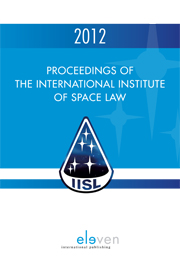|
We are now living in an era where public-private partnerships are becoming increasingly common and for good reason. The United Arab Emirates (UAE) leadership recognises the importance of these collaborations to further developing the space sector; many countries’ space efforts support this vision too. The UAE through its policies, laws and regulations supports the economy. It is aiming to attract more investors and start-ups to the UAE space sector as well as other sectors. This article will highlight the growth of the space economy, the UAE Space Vision, Policy, Strategy, attractive Legislations such as UAE Space Law and Companies Law, and finally the Courts of Space. |


International Institute of Space Law
About this journalSubscribe to the email alerts for this journal here to receive notifications when a new issue is at your disposal.
| Article |
|
| Authors | Fatheya Al Sharji |
| AbstractAuthor's information |
| Article |
|
| Authors | Darya Bohdan |
| AbstractAuthor's information |
|
The Eurasian Economic Union declared to raise competitiveness of remote sensing services, provision of geoinformation goods/services as a part of development strategy. Estimated economic effect is $500m in 10 years. Presented study aims to reveal how legal instruments are used to enhance state cooperation and pool economic resources of partner states for economic growth. |
| Article |
|
| Keywords | Space Traffic Management, Sustainable Space Rating, Sustainable Corporate Finance, Disclosure Regulation, European Green Deal, Sustainable Space Taxonomy |
| Authors | Lucien Rapp, Maria Rhimbassen and Maria Topka |
| AbstractAuthor's information |
|
Sustainable Corporate Finance (SCF) intends to respond to the climate challenge by imposing on financial operators a responsible approach in their investment operations. It takes place in the context of the European Green Deal and seeks to take advantage of the challenges and opportunities that the COVID19 crisis is offering to the spacefaring nations. Space activities should be primarily concerned by SCF. Some space activities such as earth observation contribute to the fight against climate change; they are virtuous and should attract responsible investors. Others are or may be polluting, whether it be the accumulation of space debris or the effects of uncontrolled development of space mining or space tourism. SCF could therefore contribute to reshape the global space ecosystem. |
| Article |
|
| Authors | Iliana Griva |
| AbstractAuthor's information |
|
The days when the conduct of space activities was an “invitation-only party” for governmental agencies and their guests are long gone. Apart from the popular personas and firms that have monopolized the spotlight for some time, the private sector's footprint in space is expanding at a fast rate. Thus, not only did Jeff Bezos announce his “retirement” from Amazon to dedicate more time in his Blue Origin venture, but also an increasing number of space start-ups are emerging around the globe due - inter alia - to the lowering of launch costs. Admittedly though, companies involved in the space industry are not in the business of making money - at least not yet. An inevitable question that arises is how these companies will raise the capital necessary to invest in RD, until their bottom line reflects their prospected valuations. Lately, a vehicle that has proven popular among the IPO-shy group of space companies is reverse mergers through special-purpose acquisition companies (SPACs). The rise of SPACs in capital markets has also led to the heated debate whether they are an acceptable means of “going public”, virtually democratizing finance, or whether the lack of regulation will be another “black hole” in the history of financial markets. Initially, the present paper briefly addresses the ambiguous nature and varied acceptance of SPACs in capital markets globally. It then turns to an elaborate examination of cross-border mergers between space start-ups and SPACs, which are anticipated in the months ahead. The paper further attempts to assess their potential implications, in particular whether SPACs are an optimal manner to finance companies with high-end innovation expectations, and what standards of Corporate Governance should be expected thereby. Moreover, the respective regulatory lacuna is juxtaposed to the requirement of close supervision of space activities in general. In conclusion, the paper reflects upon the democratization of space by comparing this capital-raising technique with public-private partnerships. In essence, the promotion of innovation and the survival of new players in heavily regulated realms, as is outer space, depends upon investment-friendly policies, even beyond long-standing geopolitical rivalries. To that effect, financing techniques via governmental subsidies, and their respective compliance with applicable regional regulation, is examined as an alternative. |
| Article |
|
| Authors | Jack Wright Nelson |
| Author's information |

 Issue 7 Interactive Presentations
Issue 7 Interactive Presentations